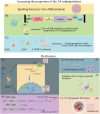Somatic cell reprogramming for Parkinson's disease treatment
- PMID: 40103698
- PMCID: PMC11911114
- DOI: 10.1002/ibra.12189
Somatic cell reprogramming for Parkinson's disease treatment
Abstract
Parkinson's disease (PD) is a neurodegenerative disease characterized by degeneration of dopamine neurons in the substantia nigra pars compacta. The patient exhibits a series of motor symptoms, such as static tremors, which impair their capacity to take care for themselves in daily life. In the late stage, the patient is unable to walk independently and is bedridden for an extended period of time, reducing their quality of life significantly. So far, treatment methods for PD mainly include drug therapy and deep brain stimulation. Pharmacotherapy is aimed at increasing dopamine (DA) levels; however, the treatment effect is more pronounced in the short term, and there is no benefit in improvement in the overall progression of the disease. In recent years, novel therapeutic strategies have been developed, such as cell reprogramming, trying to generate more DA in PD treatment. This review mainly discusses the advantages, methodology, cell origin, transformation efficiency, and practical application shortcomings of cell reprogramming therapy in PD strategy.
Keywords: Parkinson's disease; cell reprogramming; lineage reprogramming.
© 2025 The Author(s). Ibrain published by Affiliated Hospital of Zunyi Medical University and Wiley‐VCH GmbH.
Conflict of interest statement
The authors declare no conflicts of interest.
Figures


References
-
- Gao C, Huang T, Chen R, Yuan Z, Tian Y, Zhang Y. A Han Chinese family with early‐onset Parkinson's disease carrying novel frameshift mutation and compound heterozygous mutation of PRKN appearing incompatible with MDS clinical diagnostic criteria. Front Neurol. 2020;11:582323. 10.3389/fneur.2020.582323 - DOI - PMC - PubMed
Publication types
LinkOut - more resources
Full Text Sources
Miscellaneous
